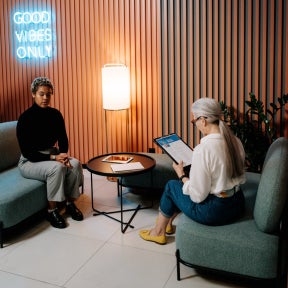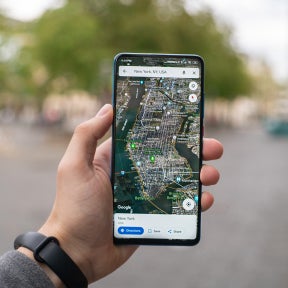How to Prepare for a Job Interview:

A step-by-step guide on how to prepare for a job interview. Includes strategies and tips on how to make a lasting impression and land your dream job.
Conduct research on the company.
Find out who you might be working for.

If it's been your goal to work for a particular company and you've been religiously following them for years, you may be able to skip this step; but candidates who are unfamiliar with potential employers will need to do thorough research before they start preparing for a job interview.
Some things you may want to find out include:
- Who they are, what they do, and where they're located.
- Founders and other key players.
- Mission statement and goals.
- The company's backstory.
- Recent milestones and other significant achievements.
- Projects and initiatives they're involved in.
- Specific details about the department you'll be working in.
- Conversations they're currently having.
- What role you will play and the contributions you can make.
You wouldn't want to bring it up in an interview, but when conducting your research, also look for red flags, such as poor reviews and lawsuits related to the company. Part of being well-prepared is finding out everything you can about your potential employer.
Start your research by looking at their social media pages and company website. Companies usually include a link to their site in any email correspondence.
Determine who the key players are and find out more about them. They may show up in Google searches, but should also have LinkedIn and social media profiles you can access.
Run a Google search on the company and see what comes up. You may also find video testimonials from previous clients and employees, which can be helpful.
Try to find video footage of the office or work environment, so you're familiar with the lay of the land when you come in for your interview.
Make sure you look the part.

This is an especially crucial aspect of the interview, whether you're doing a video call or an in-person interview. Choosing the correct outfit goes beyond merely ironing a suit or picking the right shade of lipstick. Make sure that whatever attire you choose fits in with what they wear at the company.
Pay attention to the staff's dress code in any online photos you find. Alternatively, walk by the office to catch a glimpse of what they wear. Your appearance and the outfit you choose can help you make a lasting impression, so plan it well.
Prepare for the interview.
Familiarize yourself with your resume.

The interviewer will usually have a copy of your resume in front of them throughout the interview. They may want more information about your education or previous experience, so be prepared to explain your credentials clearly.
Prior to the interview, make a note of all the training and experience you've had that's relevant to the position you've applied for. Also note any additional courses you've completed that will help you in the role.
Reflect on your personal and professional journey.

You'll invariably be asked questions where you'll need to substantiate your answers with real-life experience. Relevant examples can be difficult to come up with on the spot, but a good way to prepare for these kinds of questions is by reflecting on your professional and personal growth. Think deeply about the progress you've made over the years and jot down some key points.
Some things worth noting include:
- Significant learning curves and obstacles you've overcome.
- Goals you've reached.
- Lessons you've learned through making mistakes.
- Things you've managed to teach other colleagues.
- How your soft and hard skills have improved.
- Your involvement in projects and initiatives.
- Lessons you've learned from other colleagues.
As tempting as it is to prepare and rehearse full answers, refrain from doing this. Recruiters appreciate authentic responses, so create a bulleted list of short points that will help you think of insightful responses to questions that may be asked.
Prepare answers to common interview questions.

A few companies are adopting more contemporary interview forms, but most companies will ask a similar range of questions during your interview. These questions will help employers get to know you and gauge your goals. The wording of your answers is crucial to the message you want to convey, so take some time to look over common interview questions and what interviewers are looking for in your answers.
Read our article on common interview questions to see what employers look for in your answers.
Prepare questions for the interviewer.

Interviewers enjoy fielding questions from candidates because it shows an interest in the company and the role. Insightful questions also help the interviewer understand the level of research you've done and it's a chance to wow them with your knowledge of the company.
If you can find out ahead of time who'll be conducting your interview, you can do further research and ask questions that will really impress the interviewer.
Do a practice run.

Having a mock interview with a friend will build your confidence and allow you to practice correct body language. The aim of this exercise is to feel more comfortable with speaking about yourself, and not to rehearse every answer, as there is no guarantee that questions will be asked exactly as you practiced.
You may want to wear your interview outfit for the practice run just to ensure you feel absolutely comfortable in the clothes you've chosen.
Prepare for the unexpected.
Develop strategies for answering difficult questions.

Sometimes there's that one question that makes you stumble during an interview. Instead of getting flustered or allowing that deathly silence to fill the room, come up with a few strategies for answering these questions.
Some suggestions you may want to try include:
- Repeating the question.
- Asking them to repeat the question.
- Coming up with a phrase to use when stalling for time, such as "Oh, that's a good question!"
- Acknowledging the difficulty of the question and requesting more time to answer.
When answering a difficult question, stay calm, and avoid saying the first thing that comes to mind. If you don't have an answer ready, take a breath, use one of your strategies, and the answer will come to you.
Plan your journey.

Even if you're familiar with the area the company is located in, it's always a good idea to map out the route beforehand or to double-check the railway schedules, etc. for the day of your interview. You'll want to minimize the risk of any hiccups as these can cause unnecessary stress and even make you miss your interview.
If possible, try to travel to the interview venue before the time.
If you're doing a remote interview, make sure your equipment is working correctly, that you have access to a quiet room, and that you're using a stable internet connection. Be sure to do a practice run to check sound and lighting.
Review key points.

Read over your list of bulleted points relating to your personal and professional growth. If these are fresh in your mind for the interview, you'll be able to substantiate your answers with concrete examples from your career.
Feel free to take your notes with you to the interview, but don't refer to them during your actual interview. Similarly, if you're doing a remote interview, keep them on hand, but don't read your responses from the page.
Get ample rest.

This may seem like an obvious point, but it can be easy to forget in the days leading up to your interview. Getting a good night's sleep is one of the most important things you can do before your big day. If you're well-rested, you'll look refreshed, be less stressed, and feel more focused and capable.
Be sure to iron and prepare your outfit the night before your interview.
Should I ask about Salary During an Interview?
It seems to be undecided whether it's appropriate for a candidate to ask about the salary during an interview. A safe piece of advice is to wait until a second interview, or until a contract is being negotiated, to broach the subject.
If you ask too early, employers may think that salary is at the forefront of your interest in the role. While this is usually something candidates would like to know, it may be wise to wait until after the first meeting to inquire about it.
Group Interviews.
A group interview can seem daunting because it is harder to grab the attention of the interviewer. To prepare for a group interview, make sure that you have questions for the interviewer. This will give you a chance to make an impression and show your enthusiasm for the role.
Phone and Video Interviews.
Some companies choose to host phone or video interviews to screen candidates before deciding who to call in for in-person interviews. Companies that offer remote work may also host these interviews because of distance or because they do not have an office.
Read our article to discover the most common phone interview questions and how to answer them.
Preparing for a Video Interview:
Make sure that you have a headset and a stable internet connection. If your sound is too scratchy or you have loud surroundings, this may annoy the interviewer and cause miscommunication if they cannot hear you clearly.
Ensure that you are in a well-lit room and that you still dress appropriately for an interview. If you fail to put an effort into your appearance, this will be obvious to the interviewer and reflect badly on your interest in the role.


